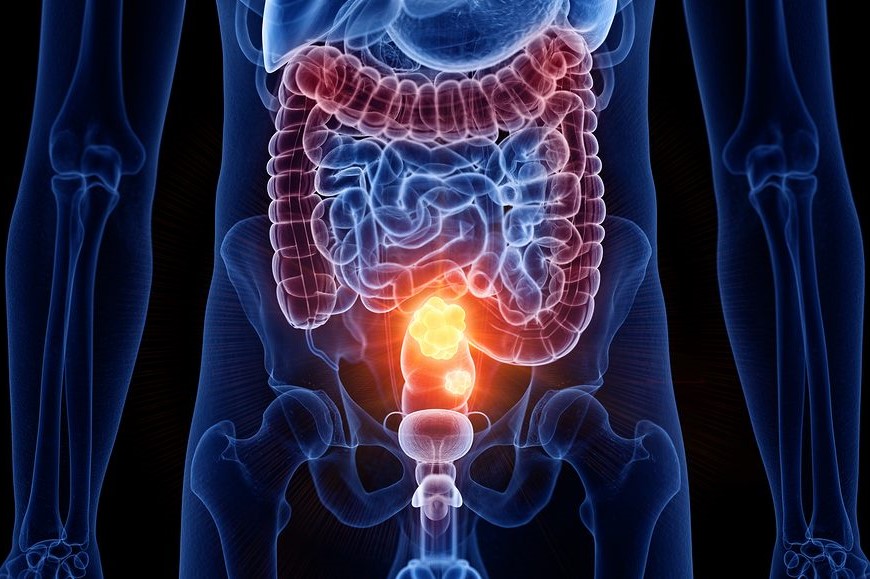
Colorectal cancer, instructions for use: how to recognise, treat and prevent it
Colorectal cancer: 50 years of age is considered by many to be “the turning point”, a significant moment in life when we look back on our achievements and list new goals
Often, however, protecting one’s health is not at the top of these lists, especially when it comes to preventing colorectal cancer: a very common cancer in adults that often begins to show symptoms when it is already in an advanced stage.
Colorectal cancer is less lethal today, yet it still affects one in ten people. Who is really at risk?
It can affect adults at any age, but there are some people who are more at risk: those over 50, those with a family and/or personal history of polyps, i.e. abnormal growths on the intestinal mucosa that sometimes become cancerous, but also patients with genetic syndromes or long-term chronic inflammatory bowel disease.
What warning signs can we expect with regard to colorectal cancer?
Most patients have no symptoms, which is why prevention programmes in the asymptomatic phase are life-saving.
They lead to an early diagnosis of the tumour and intercept polyps for removal before they become cancerous.
Remember, however, that if there is repeated rectal bleeding, unexplained pain in the abdomen with suspicious masses perceptible to the touch or weight loss not otherwise justified, or anaemia due to iron deficiency, you should immediately contact your doctor to assess the need for targeted checks.
A recent change in the habitual functioning of the bowel, either in the sense of recent constipation or recent diarrhoea may also be considered worthy of targeted investigation.
How widespread is colorectal cancer and which age group is most affected?
Colorectal cancer is a very common cancer: it affects about one in twenty people and the age of diagnosis is most frequently between 60 and 70.
Despite enormous progress in diagnosis and treatment, it is still, unfortunately, the second deadliest cancer in the world.
Cancer caught in the act. What tests can be used to diagnose it?
Colonoscopy is the most important examination because it detects not only the cancer itself but also its precursors, the intestinal polyps.
Since most polyps can be removed completely during colonoscopy, in those patients a real prevention of cancer is achieved, not just an early diagnosis.
Colonoscopy is recommended for anyone with symptoms or risk factors related to age or family history; however, it is not popular with patients because of its invasiveness and the need for bowel preparation.
However, it is not popular with patients because of its invasiveness and the need for bowel preparation.
In contrast, the faecal occult blood test is better accepted by patients and is more likely to be used in general population screening campaigns.
The test is promoted by regional prevention campaigns and people are encouraged to repeat it every two years for the earliest possible diagnosis.
Reducing the risk of colorectal cancer. What factors can we act on?
Mainly prevention and a healthy lifestyle.
Prevention makes it possible to detect the disease at an early stage, even in the pre-cancerous phase of polyps, thus increasing the chances of cure and survival.
This is why it is essential to act on health education even in younger age groups by promoting healthy lifestyle habits in order to further reduce risk factors.
Starting with prevention: yes, but how?
It is certainly a good idea to have a faecal occult blood test every two years from the age of 50, or a colonoscopy every five to seven years, depending on your personal and family medical history.
In addition, discussions with your doctor or gastroenterology specialist may lead to earlier examinations or more frequent check-ups, depending on your personal risk factors and medical history.
A helping hand on the plate: what foods to choose to prevent colorectal cancer?
It is preferable to choose fresh, seasonal and preservative-free food: vegetables are an excellent example.
The reference is always the Mediterranean diet, which recommends diversifying your daily diet as much as possible and avoiding excessive consumption of red meat and fat.
Read Also:
Emergency Live Even More…Live: Download The New Free App Of Your Newspaper For IOS And Android
Ulcerative Colitis: What Are The Typical Symptoms Of The Intestinal Disease?
Wales’ Bowel Surgery Death Rate ‘Higher Than Expected’
Irritable Bowel Syndrome (IBS): A Benign Condition To Keep Under Control
Intestinal Infections: How Is Dientamoeba Fragilis Infection Contracted?
Study Finds Link Between Colon Cancer And Antibiotic Use
What Is Sigmoidoscopy? What To Expect When Undergoing This Test


